About the Author
Having been persuaded by Platos Republic that justice requires the philosopher to go back down into the Cave, William H. F. Altman has devoted his professional life to the cause of public education, presently as a Latin teacher at E. C. Glass High School in Lynchburg, Virginia. Born in Washington D.C. where he was educated at the Sidwell Friends School, and with degrees in Philosophy from Wesleyan University, University of Toronto, and the Universidade Federal de Santa Catarina, he has been a public high school teacher in Vermont, California, Massachusetts, Connecticut, and Virginia and has taught Social Studies, History, Philosophy, English, Drama, and Latin as well as offering extracurricular instruction in Ancient Greek. He began publishing scholarly articles in Philosophy, Intellectual History, and Classics in 2007; his The German Stranger: Leo Strauss and National Socialism was published by Lexington Books in 2011.
Plato the Teacher
Published by Lexington Books
A wholly owned subsidiary of The Rowman & Littlefield Publishing Group, Inc.
4501 Forbes Boulevard, Suite 200, Lanham, Maryland 20706
http://www.lexingtonbooks.com
Estover Road, Plymouth PL6 7PY, United Kingdom
Copyright 2012 by Lexington Books
All rights reserved. No part of this book may be reproduced in any form or by any electronic or mechanical means, including information storage and retrieval systems, without written permission from the publisher, except by a reviewer who may quote passages in a review.
British Library Cataloguing in Publication Information Available
Library of Congress Cataloging-in-Publication Data
Altman, William H. F., 1955
Plato the teacher : the crisis of The republic / William H.F. Altman.
pages cm
Includes bibliographical references and indexes.
ISBN 978-0-7391-7138-7 (cloth : alk. paper) -- ISBN 978-0-7391-7139-4 (electronic)
1. Plato. Republic. 2. Justice. 3. Teaching--Methodology. I. Title.
JC71.P6A53 2012
321'.07--dc23
2011046892
 The paper used in this publication meets the minimum requirements of American National Standard for Information SciencesPermanence of Paper for Printed Library Materials, ANSI/NISO Z39.48-1992.
The paper used in this publication meets the minimum requirements of American National Standard for Information SciencesPermanence of Paper for Printed Library Materials, ANSI/NISO Z39.48-1992.
Printed in the United States of America
in memoriam
Adeline Furness Altman
(1913-2010).
But if something different manifests itself in the individual, we will return again to the state and test it there [ ] and it may be that, by examining them side by side and rubbing them against one another [' ] as it were from the fire sticks we may cause the spark of justice to flash forth [ ], and when it is thus revealed confirm it in our own minds.
Republic IV. 434e4-435a4; translation Paul Shorey.
And how, said Thrasymachus, shall I persuade you? For if you havent been persuaded by what I was saying just now, what more can I do for you? Or should I insert my teaching [ ], betaking it into your soul? My God, was what I said, Not you, indeed [ ].
Republic I. 345b5-8; translation mine.
and this rule over children [ ], our not allowing them to be free until, as it were in a city, we will have established a polity [] within them and, by fostering what is best [ ] by the same sort of thing in ourselves, have set up in its place a similar guardian and ruler [ ] in the child and then, indeed, we let it go free.
Republic IX. 590e2-591a3; Shorey translation modified.
Acknowledgements
In the case of a lifes work, ones debts cannot be justly and easily reckoned. With her unique combination of mysticism and compassion, Adeline Furness was the ideal mother for a Platonist and it is thanks to her that the first time I read a Platonic dialoguethe MenoI found it in a volume that also included Thomas Taylors translation of Alcibiades Major. She also equipped me with an intellectual for a father and Oscar Altman not only introduced me to Plato and the classics but more importantly offered me the counter-ballast of Judaism to complement her own committed monism. I was assigned the Meno by Anne Yondorf and Stephen Morse during my senior year at Sidwell Friends and the uproarious comments of my best friend Sam Gordon about bee-ness and what would seem to be the virtuous activity under the circumstances ring in my ears to this day although he himself is long gone. Also gone is Elisabeth YoungBruehl, with whom I read Cratylus in Cosmos as Language; her serious approach to the playful magic of Plato inspired me. Also inspiring was Victor Gourevitch, who made me yearn to learn Greek, and George Creeger who taught me that there was nothing more important to grasp than the difference between Plato and Aristotle. My professors at the University of Toronto schooled my passion: Wallace McLeod, Graeme Nicholson, George Edison, and above all Daniel DeMontmollin taught me the Classics although I will also never forget hearing T. M. Robinson translating Thucydides. Andreas Lehner hired me to teach History at Harwood Union and then allowed me to offer a course on Plato in 1982-83; this was the first and thus far my only attempt to teach all the dialogues in the proper reading order. The students in that seminar will live in my memory and it is a pleasure to record their names here: Dan Boyce, Cathy Boadway, Kate Hosford, Heather Harwood, Dan Finley, George Houston, Marc Wennberg, Brenda Buker, Larry Knowles, and Glenn Story; not only did each contribute to my understanding of various details but collectively they taught me that Plato, taught in order, was accessible to public high school students. My biggest regret here is that I did not yet grasp how Laws needs to be read; our day up on Camels Hump would have been much more fun if I knew then what I know now. The National Endowment for the Humanities awarded me a grant to develop Three Democracies and it was this project that made me a Ciceronian; I am profoundly grateful to the NEH of that era for assisting secondary school teachers to implement their own scholarly projects. Not only in relation to the Cave and the Alcibiades Major but also to the course as a whole, the ninthgraders of Vermonts Mad River Valley responded vibrantly to Platonic pedagogy and many happy years of teaching the history of Athens and Rome have left their mark on this book. Champlain College offered me the chance to teach Introduction to Philosophy every semester between 1988 and 1995 and the present work grows directly out of those lectures; I am grateful to Dean David Huwiler and Weston Donehower for making this possible. But a considerable amount of the formative teaching and learning was unpaid and in particular, the Academy Summer of 1986 stands out: this was when I learned about the centrality of the mathematical monad among the five mathematical sciences thanks to the delightful company of Dan Finley, Heather Harwood, George Houston, Adam Lehner, Alice Meeker, and Danny Myers. Also invigorating were the three Plato and the Bible courses I offered in Montpelier and, amid many others, Tom and Jeff Dean, John Nelson, and Diane Villemaire have helped me grow as a thinker and Ciceronian Platonist. Although I have had many fine students, the finest proved to be my own sons, Philip and Elias; never have I been so challenged, motivated, and awe-struck. Above all others, you boys have been my touchstone and whenever I think of you, my cup runneth over. But I cannot forget all the ninth-graders at Harwood who proved to me that Plato actually worked, especially Seth Brunnell who woke up on the day when I was teaching the Cave. The older students I taught at Champlain, Wes Donehower Jr. in particular, also proved that Plato has not forgotten the art of changing lives. It is finally a crowning pleasure to thank my beautiful wife Zoraide: your support for, and belief in me has made this book possible, especially since it was in our beautiful green room on the Rua Anita Garibaldi in Floripa where it first hit me in the middle of the night that I could divide


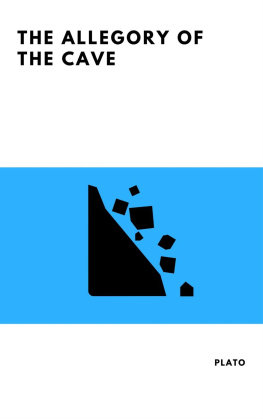
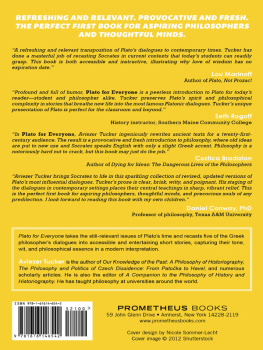


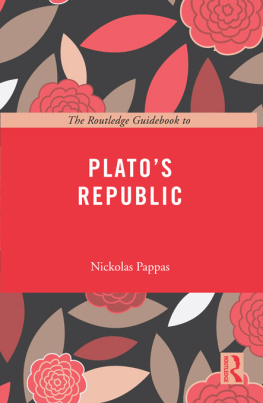
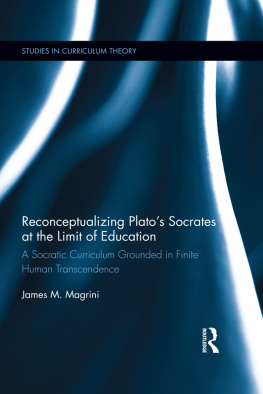
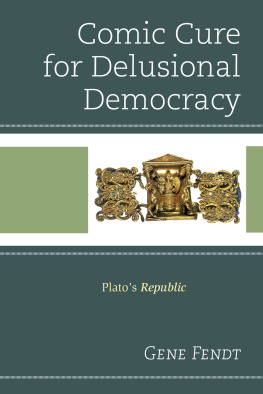
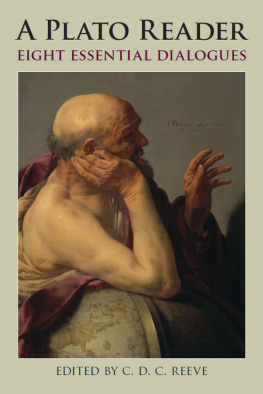

 The paper used in this publication meets the minimum requirements of American National Standard for Information SciencesPermanence of Paper for Printed Library Materials, ANSI/NISO Z39.48-1992.
The paper used in this publication meets the minimum requirements of American National Standard for Information SciencesPermanence of Paper for Printed Library Materials, ANSI/NISO Z39.48-1992.